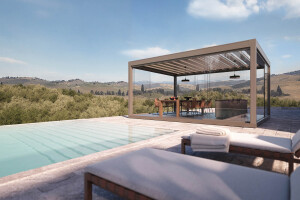The Workshop House is set in a flat, rectangular but not regular terrain and belongs to one of the most recognized plastic artists in Yucatan.
The work of this artist is characterized by being, in her words, "divinely crooked." Imperfection and spontaneity are a characteristic that highlights the artist's lack of concern for detail but also highlights the strength and sensitivity of her work.
The Workshop House intends to express these same characteristics in its physiognomy and in its formal treatment. The house has a closed expression to the outside that consists of a series of “boxes” that are assembled together generating a volumetry that plays with the corner in which it is arranged, and that never reveals its content. The interior is illuminated and ventilated through courtyards generating an absolutely fluid and transparent atmosphere.
The materiality of the house includes two materials only, the concrete cast on site and stone walls of the region. The concrete volumes contain the program, while the walls made of masonry or stone of the region are those that enclose courtyards that allow the entry of light and wind into the spaces.
We consider that the Workshop House represents an effort to emulate the personality of this artist's work, of a wonderful goodness inside, but whose shell must be broken to understand it and enter it.
















































